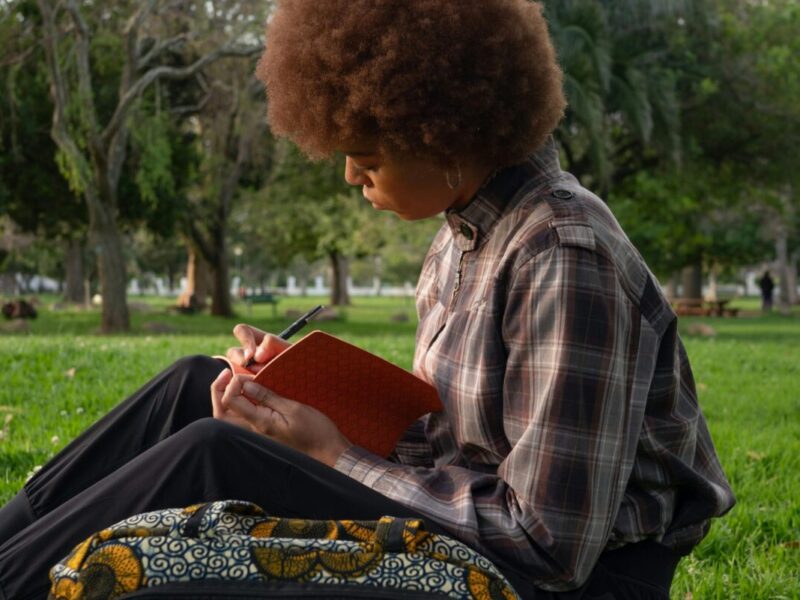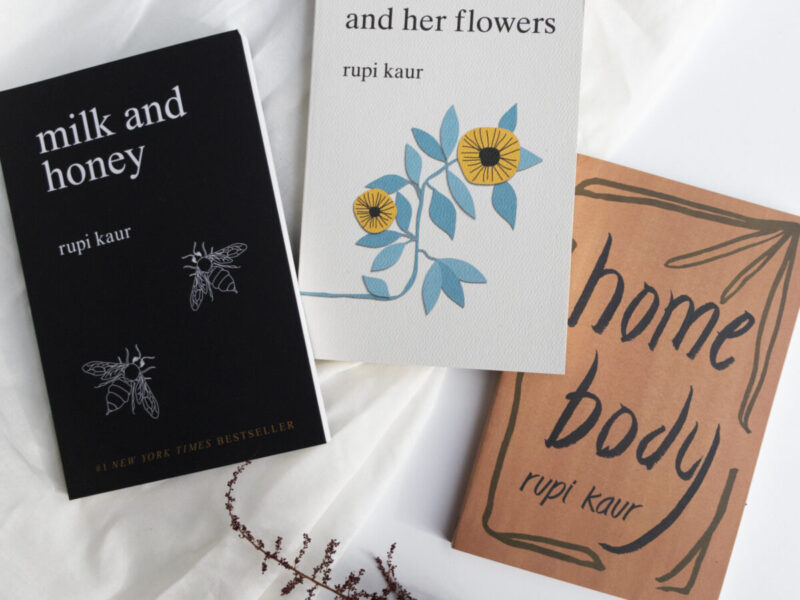Poetry and Oscar-Nominated Film Pairings: 6 Cinematic Collections
The Oscars are on March 12, and this awards season the contenders are wide-ranging. From the wacky, sci-fi breakout favorite Everything Everywhere All At Once to the quiet and understated Aftersun, each nominee sparkles in its own unique, evocative way. If you enjoyed the imagery, emotion, and storytelling of these renowned films, these poetry collections offer the same engrossing experience.
1. Tar and Every Good Boy Does Fine by Calvin Arsenia
Tar tells the story of the titular Lydia Tar, a fictional, world-famous conductor for the Berlin Philharmonic. The movie chronicles Tar’s rise to acclaim as the first woman conductor of the symphony, as well as delves into her queerness and an unexpected, redefining scandal. If you loved the musical world of Tar, you won’t be able to put down Every Good Boy Does Fine, the 2021 poetry debut of singer and classical harpist Calvin Arsenia. Throughout the collection—which is titled after the mnemonic device used to teach the treble clef’s lines—Arsenia showcases his endless passion for music, as well as uses it as a powerful metaphor for queerness, sexual awakening, and coming-of-age.
2. Women Talking and Our Lady of Ruins by Traci Brimhall
Women Talking begins with the women in an isolated, religious community gathering together in secret to discuss the continued sexual violence men have perpetuated against them, as well as to make a heavy, potentially life-changing decision—whether to do nothing, stay and fight, or leave the town and everything they know behind. The film unfolds mostly in one room, an intimate directorial choice that lends extra spotlight to the characters’ harrowing experiences, close bonds, and courageous voices. Traci Brimhall’s Our Lady of Ruins also focuses on women on a pilgrimage—this one a journey through a post-apocalyptic world—and similarly grapples with religion as their definitions of God and faith evolve.
3. The Fabelmans and The Cineaste by A. Van Jordan
Above all, Stephen Spielberg’s The Fabelmans, based on the director’s own upbringing and life, is a love letter to the medium, beauty, and influence of film. The protagonist, Sonny, falls in love with filmmaking in the movie, pursuing it through the obstacles of family disapproval, family tragedy, and antisemitic discrimination. Similarly, The Cineaste takes inspiration from poet A. Van Jordan’s lifelong fascination with film and regular routine as a moviegoer. Within its pages, The Cineaste remarks not only on film’s vividness and distinct aesthetic, but also on the power of film to drive societal dialogues and change.
4. Everything Everywhere All At Once and Soft Science by Franny Choi
Everything Everywhere All At Once looks poised to take home the most Oscars of all the nominees, after it captured both audiences’ and critics’ hearts by balancing wild, futuristic adventure with relatable, heartwarming family dynamics. In the movie, an immigrant mother learns that multiple universes exist, and that she’s at the center of a fantastical, life-or-death battle. As she learns about all the different lives she could have had—with most paths seeming more glamorous than her current life as a laundromat owner—she’s reminded to appreciate the relationships, contentment, and love that lie beneath the seemingly mundane. Franny Choi’s Soft Science, a finalist for both the Lambda Literary Award and the Believer Book Award, also tells a queer, Asian-American, and deeply relatable story through otherworldly elements. Choi imagines the futuristic implications of artificial intelligence and automation, using these inhuman figures to explore uniquely human emotions and realities.
5. Aftersun and Late Father and Other Poems by Taylor Mali
Aftersun might just be the quietest film to end up on the Oscar list, as it largely follows just two characters—a young father and his precocious, pre-teen daughter—on a short holiday. It’s later revealed that this vacation, while short in duration, has remained suspended in the daughter’s mind as the calm before an unexpected upheaval and tragedy. She continues to rewatch the home videos documenting that trip that she created as a child, haunted by what signs they might reveal about her father’s life, emotional reality, and personal struggles. As she becomes a parent herself and reaches the age her father was on the trip, she’s even more desperate for answers. Late Father and Other Poems also offers a window into how grief is sharpened by one’s own parenthood, as Mali recounts both his relationship with his late father and his own journey of becoming a father.
6. Elvis and The Women Who Loved Elvis All Their Lives by Fleda Brown
Elvis is a biopic foray into the bombastic and storied life of Elvis Presley. The film peers behind his enigmatic persona, revealing truths about the man beneath the artifice, fandom, and celebrity. In addition to exploring his rise to fame and personal life, Elvis also depicts the stratospheric cultural influence of its titular character. The Woman Who Loved Elvis All Their Lives, part of the Carnegie Mellon Poetry Series, similarly looks at cultural obsessions, celebrity crushes, and the emotional windfall when a worldwide idol dies.




